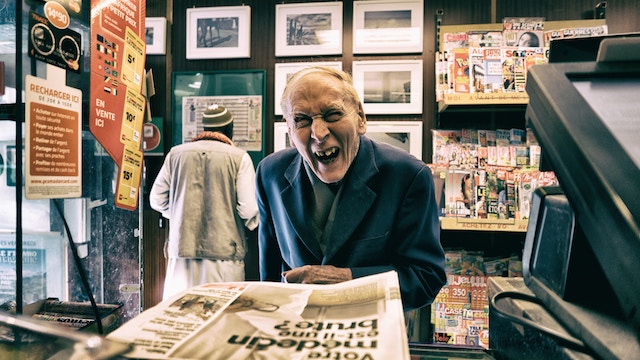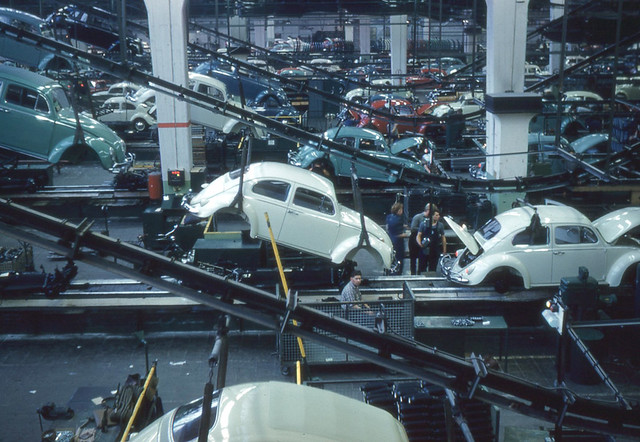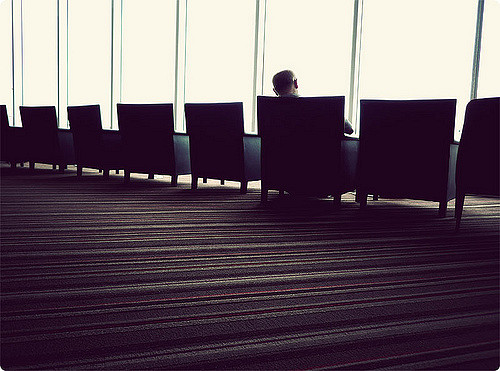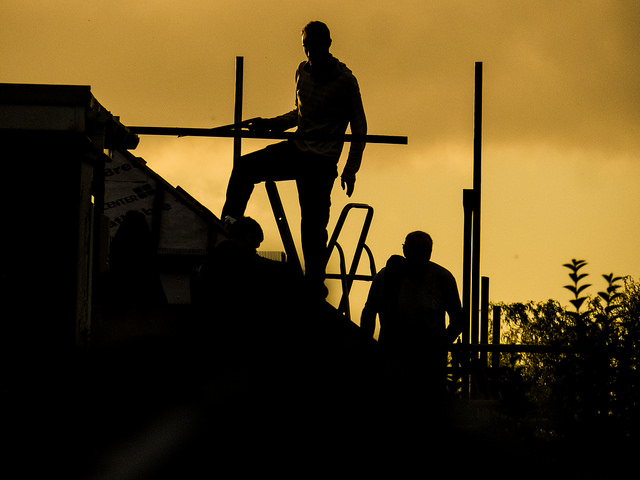Unlock the Magic in Your Story Now
Get the Free 20 questions to Ask Before Launching Your Idea workbook when you sign up for occasional updates.
Get the Free 20 questions to Ask Before Launching Your Idea workbook when you sign up for occasional updates.
Articles filed in: Worldview
By Heart Vs. With Heart
filed in Meaningful Work, Success, Worldview

When we were taught poetry in primary school, my classmates and I were encouraged to learn verses by heart. The teacher would call upon us during a lesson to stand and recite a poem or a verse.
This was how we learned the words that were written without understanding the depth of their meaning. We knew the poems by heart, but we didn’t know what to make of them or why they should matter to us because we never learned to say them with heart.
We have the opportunity every day to work by heart or to choose to do it with heart.
The more often we choose the latter the better for all of us.
Image by Josh Applegate
Growing Small
filed in Meaningful Work, Success, Worldview

I remember landing my first ‘real’ job like it was yesterday.
One of the big British supermarket chains was opening a huge store not far from where I lived in Dublin. It was good news for the hundreds of people who would be employed there—more jobs, more choice for consumers—a win-win.
At fifteen, I thought I would get a weekend job on the checkouts, but instead, I was given the title, Stock Control Assistant, a navy blue uniform, and a clipboard. My job was to ‘assist’ the stock controller—a man wearing a red blazer, with a bigger clipboard, to record how much produce had been sold in the past week. The Stock Control Assistants met at eight o’clock every Saturday in the draughty warehouse before being assigned a section to record. The unlucky ones were assigned to frozen foods—not much fun in Dublin winters.
By nine, I’d find myself scaling shelves in the warehouse, crawling over pallets of baked beans and instant soups, counting every single packet and can. After lunch, we’d move into the store to count the items on the shelves. We were under strict instructions to stay on task and not to ‘serve’ customers while we were on the shop floor. That was somebody else’s job.
I’d kneel on the floor in front of the macaroni cheese so I could see right to the back of the shelf, making sure I was recording the right number. Then a shopper would reach over me, take a can, and pop it in his basket.
Two weeks in I realised our job was futile. However accurate we tried to be, we’d never get the numbers right. But the part of the job that mystified me more was the instructions about leaving customers to their own devices. How could we ignore the elderly lady who was struggling to reach a jar of beetroot on the top shelf? Surely well-stocked shelves and low prices weren’t enough to keep customers coming back?
What I’d witnessed about how to build a business growing up in the suburbs was the opposite of this. My mother’s butcher knew her by name and her order by heart. The grocer stopped and chatted to her for what seemed like an eternity to us kids waiting to pay and get home to play. The baker would make sure he only sold her the freshest bread. None of these small business owners won by having the most stock. They won by taking the most care.
As you’ve probably guessed, I didn’t last long in the giant supermarket. The salary and subsidised lunches weren’t enough to keep me there. They didn’t feed my soul.
The big store lives on today. But it’s not as popular as it was in those early days when it first opened. And the supermarket chain is changing its strategy. Like many retailers, they are opening smaller, local stores to cut costs. Going small is the new growth strategy. It looks like we are circling back to a time of more care and connection. I believe that’s what our customers (and we) want.
Image by Johann Walter Bantz
Stand Out

When we think about standing out, we often think about how we’re being perceived at a given moment. But memorable people, places and experiences stand out because of how they make us feel over time.
Standing out doesn’t necessarily mean being the loudest, most visible person in the room right this minute.
You, your product or your company can stand out by changing how someone feels about themselves in your presence, not just today, but every day.
Image by Chris Candid
Efficiency Vs. Meaning

Mike’s been driving for Uber for three years. In that time he’s done 20,000 trips while maintaining a consistent 4.94-star rating. Mike works when he wants to. He’s earning more than enough money to pay the bills, and yet he can’t help feeling there’s something missing.
Mike is a phenomenally successful Uber driver by any measure, and yet he doesn’t feel successful. Despite his best efforts and his stellar record Uber doesn’t differentiate him from any other driver. And he knows most of his passengers don’t either.
In the industrial age, factory owners prioritised efficiency above meaning. In our technological age, some still do. But as workers, we do the reverse. We don’t want to be anonymous robots.
When we’re no longer part of the assembly line, we are responsible for our effort, and how much to care, or not to care. The fruit of our labour becomes about more than the exchange of time for money. Work is no longer transactional. For people like you, me and Mike, that means choosing to do the work that gives us that meaning, for the people who find it meaningful.
Image by Roger W
We Are The Culture
 Culture is all around us. Our shared values and beliefs are palpable in the places we visit and the people we meet. We absorb those values from the media we consume and the ideas we expose ourselves to. One of the best ways I know to witness how we can shape our culture is to take a taxi ride in a new city.
Culture is all around us. Our shared values and beliefs are palpable in the places we visit and the people we meet. We absorb those values from the media we consume and the ideas we expose ourselves to. One of the best ways I know to witness how we can shape our culture is to take a taxi ride in a new city.
Every vehicle has a distinct culture that’s created by the driver’s posture. It starts with how the driver dresses and the conversation he or she makes. It’s heavily influenced by the cleanliness of the car and the kind of music the driver plays. And of course, it’s dependent upon his or her attitude to other motorists and how each driver finds meaning in their work. The environment can soothe or agitate, demotivate or inspire.
In taxis on every continent around the world, you can encouter zen and mala beads, negative news channels on the radio accompanied by rude hand gestures out the window. You will meet people who find dealing with passengers a chore and many more who are grateful for work and the feeling of autonomy.
In our communities and businesses, we often lament over our lack of control. We get despondent about what can’t be done to change things—all the while overlooking the endless opportunities we have to change everything. We are the community, the business and the culture. We are the makers and the making of the entities and places that shape our world.
We are more powerful than we think.
Image by MF Poon
How Matters
filed in Storytelling, Strategy, Worldview
 The woman clearing tables in the Qantas airport lounge is almost invisible to the many preoccupied travellers she cleans up after. People are anxious to charge their devices, grab a bite to eat and catch their flights. The lounge attendant scrapes plates of half-eaten food and piles them on a trolley to take back to the kitchen. Sometimes people stop to ask her where they can get a drink or an extra spoon, but they don’t really see her.
The woman clearing tables in the Qantas airport lounge is almost invisible to the many preoccupied travellers she cleans up after. People are anxious to charge their devices, grab a bite to eat and catch their flights. The lounge attendant scrapes plates of half-eaten food and piles them on a trolley to take back to the kitchen. Sometimes people stop to ask her where they can get a drink or an extra spoon, but they don’t really see her.
Out of the corner of her eye, she notices a passenger, his feet awkwardly perched on the table, balancing a Macbook on his knee. It’s a bad angle to work at, but at least he’s got a socket and WiFi. Two minutes later, the attendant appears in front of him with a low stool to rest his feet on. She helps him to turn his chair, so he’s not straining his back while he works. Then she silently returns to wiping tables and clearing plates as the travellers busy themselves all around her.
You may not always get to choose the work, but how you do it is always a choice.
Image by Ian
The Number That Matters
filed in Strategy, Success, Worldview
 Every so often I look at the list of readers who have subscribed to my blog but have stopped opening the emails they signed up to receive. When I see that they’re no longer interested, I unsubscribe them. I’ve personally done this almost 10,000 times over the past seven years. It’s harder than you think at first because we’ve been conditioned to believe that the only number that matters is the biggest one. What’s more important to me, and I’m guessing you too, is to reach and serve the people I can make the most difference to. That means respecting the choice of the people who are no longer engaged.
Every so often I look at the list of readers who have subscribed to my blog but have stopped opening the emails they signed up to receive. When I see that they’re no longer interested, I unsubscribe them. I’ve personally done this almost 10,000 times over the past seven years. It’s harder than you think at first because we’ve been conditioned to believe that the only number that matters is the biggest one. What’s more important to me, and I’m guessing you too, is to reach and serve the people I can make the most difference to. That means respecting the choice of the people who are no longer engaged.
What would our world look like if we doubled down on only making work for the people we can move and only paid attention to the things that have the power to change us?
Image by Karina Yeznaian
Better Than Before
filed in Strategy, Success, Worldview
 Our plumber, Evan, spends every minute of his day solving problems. There are no breaks to check email or to see who’s commented on Facebook. He’s too busy working things out, wondering where the source of the problem is or deciding how he might make the repair more robust than what was originally installed. Evan regularly deals with frantic customers and unreliable suppliers. He crawls over hot tin roofs in summer and trawls through muddy backyards in winter. He squeezes his head under toilet bowls and his body into roof spaces. A lot of his workmanship is invisible, hidden behind plasterboard and covered by tiles.
Our plumber, Evan, spends every minute of his day solving problems. There are no breaks to check email or to see who’s commented on Facebook. He’s too busy working things out, wondering where the source of the problem is or deciding how he might make the repair more robust than what was originally installed. Evan regularly deals with frantic customers and unreliable suppliers. He crawls over hot tin roofs in summer and trawls through muddy backyards in winter. He squeezes his head under toilet bowls and his body into roof spaces. A lot of his workmanship is invisible, hidden behind plasterboard and covered by tiles.
Evan’s job is a juggling act, tough work by every measure, yet he acts as if the work itself is a privilege—not just a means to an end—but an end in and of itself. He takes pride in his ability to use his hands and his head to make things better. He seems to see challenges as opportunities to do something right.
Of course, it’s not possible to always see a problem as an opportunity, but we can choose to be grateful for the chance to leave something better than we found it, no matter what work we do.
Image by Nikk
Pedestals
 Whoever said you should never meet your heroes was only partly right. There is an element of truth in the adage. Reality can rarely compete with the imaginary. Fleeting, real encounters are flat—two dimensional at best. The imagined meeting is all deep connection and unspoken understanding on both sides. In matters of hero worship, the admirer has the unfair advantage over the admired. The poor hero has little sense of the depth of feeling and gratitude upon which his pedestal is built.
Whoever said you should never meet your heroes was only partly right. There is an element of truth in the adage. Reality can rarely compete with the imaginary. Fleeting, real encounters are flat—two dimensional at best. The imagined meeting is all deep connection and unspoken understanding on both sides. In matters of hero worship, the admirer has the unfair advantage over the admired. The poor hero has little sense of the depth of feeling and gratitude upon which his pedestal is built.
The problem isn’t that we shouldn’t have heroes or build pedestals, it’s that we erect our pedestals too infrequently and for too few. What makes the girl putting in an eight-hour day shampooing hair at the salon, carefully placing fresh towels under strained necks, less or a hero than the rock star who can dazzle the crowd for an hour? Why do we value the contribution from the stage above the one from the heart?
We believe in superstars whose job it is to live up to the image we’ve created. What if instead of looking to the false gods of our imagination for inspiration, we applauded the real acts of ordinary heroism we choose to ignore? When we change our attitude to greatness we change the way we move through the world.
Image by Martin Fisch
Three True Stories
filed in Storytelling, Worldview
 To all of Arthur’s family,
To all of Arthur’s family,
We were so sorry that everything ended up so badly for you all last week.
It is so difficult when owners are prepared to do anything to cure their pet’s problem and it’s still not possible. Thank you for allowing us to try.
He was part of your lives for a short time but it’s amazing how quickly they become part of the family. You are sure to be missing him terribly, we can only hope that each day gets a little bit easier.
Regards
Damian, Paul, Joanna, Rob, Nicole, Jane, Jo, Kris, Amy and all at the vets.
____________________
To the Ryan family,
Just a short note to express our deepest sympathy over your loss of Wilbur. It takes a pretty amazing dog to make it to 19. I think his attitude and tenacity helped him to get there. We hope you have lots of happy memories of Wilbur, as part of your family he will be deeply missed.
Yours Sincerely
Kristen, Garry, Edgar and everyone at the vets.
_____________________
One of my dear friends was diagnosed with cancer last week. She had a five biopsies taken on Friday and was sent home to wait until Tuesday or Wednesday. Her husband and three sons held their breath for four days.
Tuesday came and went. Nobody called. It’s okay that they didn’t have the results. It’s not okay that they didn’t care enough to make time to call and say, “No news yet. Are you okay? Hang in there.”
Each of us has the opportunity to touch someone every single day. To really see people. To add meaning. To care. I’m not sure we do it often enough.
You might not be able to change the outcome, but you can change how people feel in a heartbeat.
Image by B.